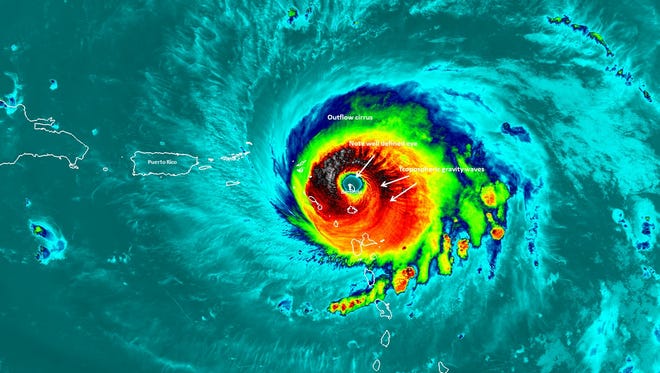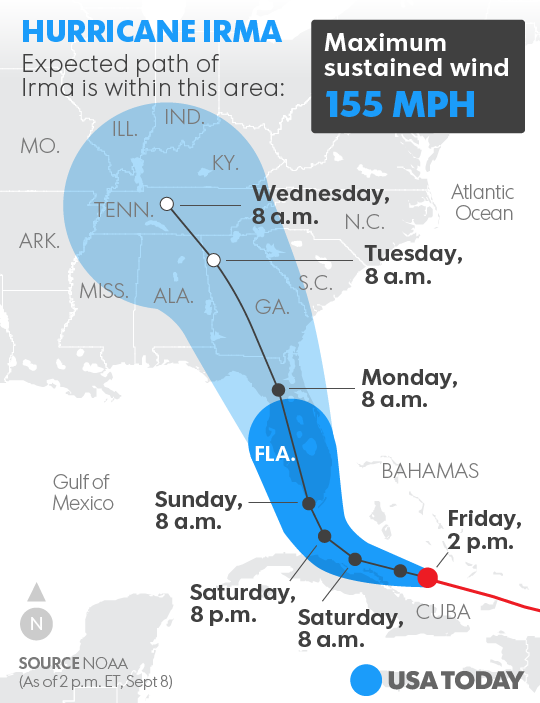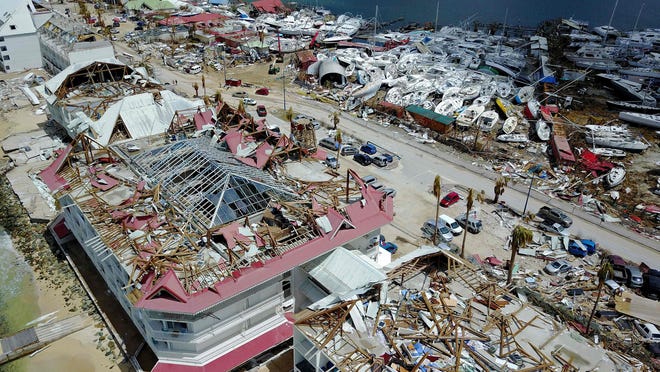Could Hurricane Irma Continue to Turn West

MIAMI — The National Hurricane Center upgraded Hurricane Irma back to a Category 5 on Friday night, as the storm remained extremely powerful and forecasters warned of hurricane-like conditions all the way into Central Florida.
The center issued a hurricane warning for most of South Florida as Irma continued its devastating march across the Caribbean, blasting 155 mph winds and leaving a trail of destruction in its wake. Governors of four Southeast states declared emergencies.
Here is what we know:
Where is Hurricane Irma now?
As of 11 p.m. ET, Hurricane Irma's winds were measured at 160 mph, according to the National Hurricane Center. The center of the hurricane was located about 300 miles south by southeast of Miami and was moving to the west at 13 mph. Irma made landfall at the Camaguey Archipelago in Cuba.
Where is Hurricane Irma heading?
On the current forecast track, the eye of Irma should continue to move near the north coast of Cuba and the central Bahamas for the rest of Friday night and Saturday, and be near the Florida Keys and the southern Florida peninsula Sunday morning, the hurricane center said.

What part of Florida is under the hurricane warning?
The National Hurricane Center had initially issued a hurricane warning for most of South Florida. Late Friday afternoon, the hurricane warning had been extended northward toward the central part of the state, including the east coast of Florida to Sebastian Inlet, and along the west coast of the peninsula northward to Anna Maria Island, southwest of Tampa.
A hurricane watch has been extended northward along the west coast of Florida to Suwannee River. A Storm Surge Watch has been issued north of Venice to the Anclote River, including Tampa Bay, and from Ponce Inlet to the Flagler-Volusia County Line, according to the hurricane center.
Will Hurricane Irma hit Florida?
The National Hurricane Center's forecast path for Irma has it hitting South Florida, including Miami and perhaps its highly developed and expensive central region, then up through affluent Broward and Palm Beach counties and farther north, threatening the entire peninsula.
"I'm afraid Irma is going to track too far west and put most of south Florida right in the eyewall," Colorado State University meteorologist Phil Klotzbach said.
Ryan Rogers, a meteorologist with the National Weather Service in Mobile, Ala., said the agency is confident the storm will turn to the north at some point after making landfall in South Florida, but it remains unknown exactly when that will happen.
When will Hurricane Irma hit Florida?
Most models have lrma making landfall in Florida sometime early Sunday, but wind and water will be blasting the state before that. Irma is forecast to remain strong as it heads north, so it's unclear how far up state the storm's power will be felt.
"It's not a question of if Florida's going to be impacted, it's a question of how bad Florida's going to be impacted and where the storm ends up," Brock Long, administrator of the Federal Emergency Management Agency, told reporters Friday.
How strong will Irma be when it hits?
The hurricane center said some fluctuations in strength are likely over the next day or two but Irma is expected to stay a Category 4 storm through landfall in Florida.
What is the biggest concern from the storm?
A fast-moving storm means the region could avoid the unrelenting rains that Harvey brought to Texas. Florida Gov. Rick Scott, who announced the closing of all state schools, colleges and universities through Monday, warned state residents that even if their town is spared the brunt of Irma's wind and rain, there are other dangers. "My biggest concern is the amount of storm surge this storm will bring," Scott said from the state Emergency Operations Center in Tallahassee. "This can kill you."
Scott added on Friday afternoon, "We will quickly run out of good weather to evacuate."
Should I be worried about Hurricanes Jose and Katia?
Two additional hurricanes, Jose and Katia, are roaring in the Atlantic Basin, and neither will hit the U.S. but other countries will be impacted.
Over the weekend, Jose could slam into some of the same Caribbean islands flattened by Irma just a few days ago, the National Hurricane Center said.
A hurricane watch has been posted for Antigua and Barbuda, parts of which sustained catastrophic damage from Irma. Torrential rainfall from the hurricane could produce "life-threatening flooding" by Saturday across both islands. The British Virgin Islands are also in Jose's path.
Meanwhile, hurricane warnings were issued from Cabo Rojo to Laguna Verde in Mexico as 100-mph Hurricane Katia takes aim on that nation's east coast.
The storm has claimed at least 20 lives in the Caribbean.
President Trump weighs in
President Trump took to Twitter Friday morning to urge Americans along Irma's path to take necessary precautions and "get out of its way, if possible."
"This is a storm of absolutely historic, destructive potential," Trump said in a video message posted on social media Friday morning. "I ask everyone in the storm's path to be vigilant and to heed all recommendations from government officials and law enforcement. Nothing is more important than the safety and security of our people."
More than 600,000 face evacuation orders
Florida, Georgia, South Carolina and North Carolina declared states of emergency ahead of the storm. In Miami-Dade County alone, about 660,000 residents are under evacuation orders.
The Florida Keys, Miami Beach, and parts of Broward County, home to Fort Lauderdale, were among areas under mandatory evacuation orders. Officials also announced mandatory evacuations of the Glades communities south of Lake Okeechobee ahead of Hurricane Irma.
The U.S. Army Corps of Engineers predicts the Herbert Hoover Dike containing Lake Okeechobee "will not be compromised" by Hurricane Irma. But there are concerns that Irma's winds could push water over the dike. The seven cities under mandatory evacuation orders are South Bay, Lake Harbor, Pahokee, Moore Haven, Clewiston, Belle Glade and Canal Point.
The same area was hit back in 1928 by the Okeechobee hurricane, which made landfall with 145 mph winds. The dikes failed then and at least 2,500 people drowned, most of them farmworkers and their families.
In Georgia, Gov. Nathan Deal ordered evacuations along the coast. He has declared a state of emergency for 30 Georgian counties and said it is "very likely" he'll be forced to expand the declaration to a larger swath of Georgia.
Evacuees facing unprecedented challenges
Hurricanes in Florida usually hit from the east or west, allowing residents to flee north or south to avoid the damage. But with Irma projected to make an unusual landfall from the south, the behemoth could envelop the entire Florida peninsula. That has forced evacuees to drive farther and farther north.
Concern about fuel shortages
Florida Gov. Rick Scott said his office is working with gas suppliers to ensure that gas stations along the Florida Turnpike and I-95 — the main highways leading out of Miami — are kept open and stocked. Scott has asked gas stations in the evacuation zones to stay open as long as they can, and promised operators his administration will provide workers police escorts to evacuate the area when the time comes.
"We are devoting every state resource, and the federal government is working to try to make sure we have all the fuel we can get here," Scott said Friday afternoon. "If you're in an evacuation zone in South Florida, just remember you need to leave now."
In Washington, the Trump administration issued a waiver to a law known as the Jones Act, which requires that only U.S.-flagged vessels can carry domestic fuel shipments, said White House Homeland Security Adviser Tom Bossert.
The move is meant to help "bring as much fuel as possible in to help Floridians," Bossert said.
Scott also urged Floridians who do not have enough fuel for their vehicles to call a state hotline at 1-800-342-3557 for assistance in evacuating.
Can evacuees still fly out of South Florida?
Several of Florida's busiest airports have already announced they'll suspend flights as Hurricane Irma advances toward the state. Orlando and Fort Lauderdale are among those to say flights will be halted. Other airports are likely to do the same if Irma's projected track holds.
At Miami International Airport, anxious fliers waited to see if their planes would depart, while airport personnel helped hundreds of others with already canceled flights evacuate Miami International Airport for hurricane shelters Friday.
Many of the stranded travelers who didn't get out in time were visiting from abroad and spoke little English, causing confusion about what was happening. Around 1 p.m. shuttles began collecting fliers and airport staff went person-to-person checking on needs.
By 11 a.m. Friday, 271 departing flights and 324 arrivals were canceled at the airport, more than half its average daily schedule.
How bad could the damage be in Florida?
Florida has seen Category 5 hurricanes, with winds greater than Irma. Hurricane Andrew roared into South Florida 25 years ago, a fast-moving storm that flattened neighborhoods, tossed cars and trucks around like Matchbox toys, and left millions without power. The storm destroyed more than 25,000 homes and damaged 100,000 others. An Andrew-like storm hitting downtown Miami could cause $300 billion in damage, according to one insurance underwriter.
How much damage has Irma caused already?
After Irma struck Barbuda, its prime minister called the island "barely habitable" and St. Martin, an island split between French and Dutch control, saw extensive damage and was almost completely destroyed in places. In the U.S. Virgin Islands, Irma tore off roofs and crippled the only hospital on St. Thomas. The British government said the British Virgin Islands needs extensive humanitarian assistance. Destruction in Puerto Rico and Haiti does not appear to be as bad as feared.

What should I do about my pet?
The American Veterinary Medical Association is reminding pet owners developing disaster plans to include pet evacuation kits. The list is extensive. Important components include 3-7 days worth of food, a two-week supply of medicine, 7 days of water, a dish and water bowl, flea and tick prevention, ownership documents and some "comfort" toys. The Shelter Medicine Program at the University of Florida, part of the state's disaster response system,says are many pet-friendly shelters that allow the whole family to stay together. "Do not leave your pet behind," the program urges. "If it's not safe for you, it's not safe for your pet."
What was the strongest storm to hit U.S.?
The strongest storm ever to make landfall in the U.S. hit on Sept. 2, 1935. Hurricanes were not officially named back then, but this one became known as the Florida Keys or Labor Day hurricane because of where and when it hit. The hurricane slammed across South Florida with sustained winds of 185 mph, killing 423 people. Awful as that storm was, perhaps the most horrific storm came 35 years earlier, flattening Galveston, Texas, and killing an estimated 6,000 to 8,000 people.
Contributing: Doyle Rice, Bart Jansen, Alan Gomez, Gregory Korte, Caryn Shaffer and Jospeh Bauccum
Source: https://www.usatoday.com/story/news/2017/09/08/hurricane-irma-where-category-4-storm-now-and-where-headed-next/645005001/
0 Response to "Could Hurricane Irma Continue to Turn West"
Publicar un comentario